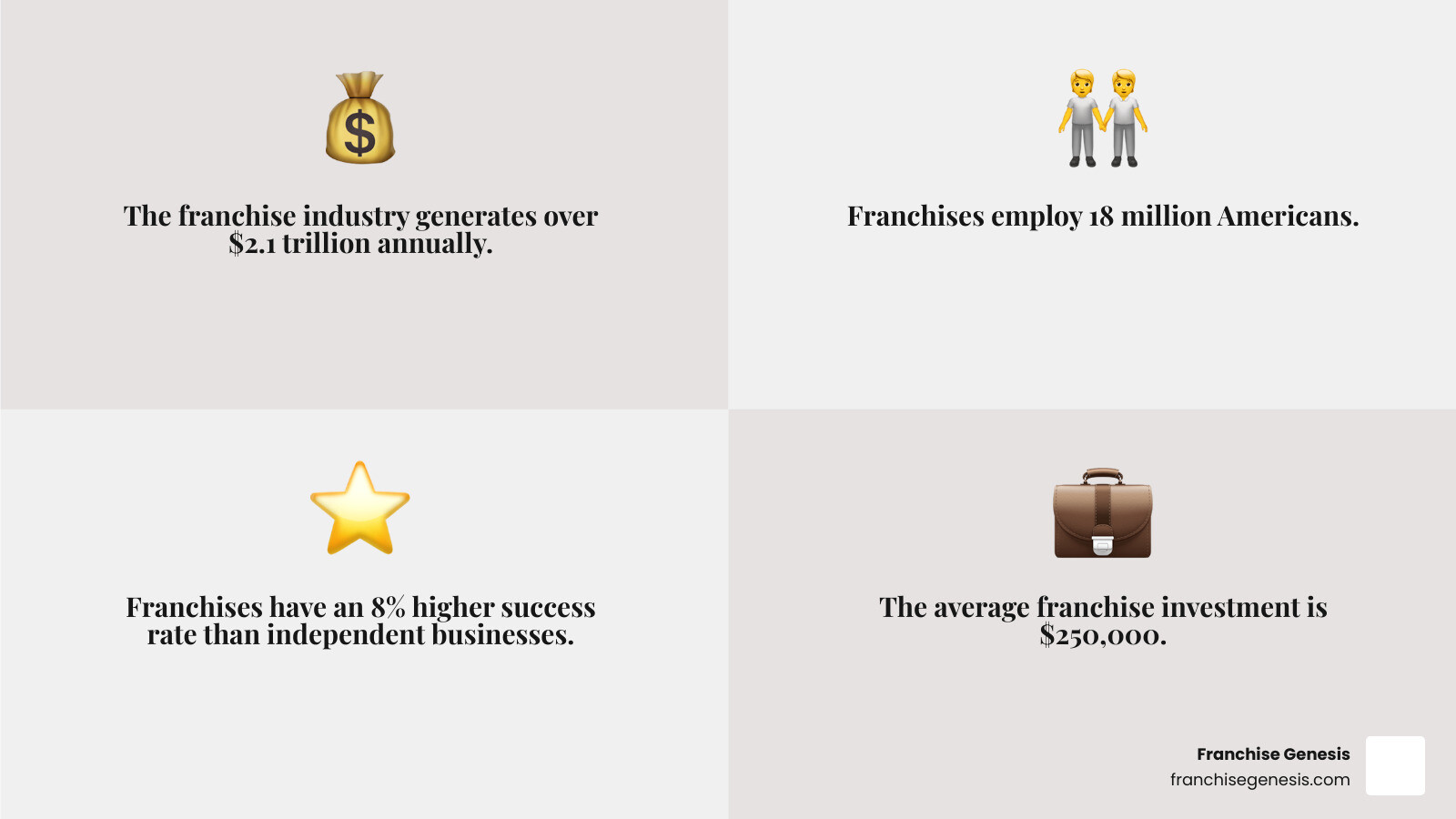Why Franchise Business Opportunities Are Changing Business Growth
Franchise business opportunities are a powerful expansion strategy, with the franchise industry generating over $2.1 trillion annually and employing 18 million Americans.
Here’s how franchising can transform your business:
- Rapid Market Expansion – Scale your brand across markets without the capital burden of company-owned stores.
- Motivated Owner-Operators – Franchisees invest their own money, creating highly motivated partners.
- Reduced Financial Risk – Leverage franchisee capital while maintaining brand control and collecting royalties.
- Proven Success Rates – Franchises boast an 8% higher success rate than independent businesses.
- Multiple Revenue Streams – Generate income through franchise fees, royalties, and marketing funds.
The path from a single location to a successful franchisor requires careful planning and legal expertise. Many business owners underestimate the complexity of creating sustainable franchise business opportunities that attract quality partners while protecting their brand.
As Eric Stites, CEO of Franchise Business Review, notes: “Some of the greatest opportunities are in franchises most people have never heard of before.” This highlights the potential for local businesses to become national successes.
I’m Monique Pelle-Kunkle, Vice President of Operations at Franchise Genesis. I’ve helped scale numerous franchise business opportunities from concept to over 100 locations, guiding owners through every phase of franchise development.

Why Franchising is a Premier Growth Strategy
Franchising offers a unique blend of control and scalability, allowing your business to grow far beyond what company-owned expansion could achieve. It’s a strategy that can transform a local success into a national phenomenon. By replicating your business model across states, you leverage the capital and entrepreneurial spirit of dedicated owners. This allows for faster market penetration without relying solely on your own financial or management bandwidth.
This approach significantly reduces your capital outlay. Instead of funding every new store, you receive an initial franchise fee and ongoing royalties from each franchisee. This lets you expand your brand and market share without the heavy financial burden of rapid growth. Furthermore, franchising requires you to systematize your operations. Documenting every process ensures brand consistency and serves as a robust training tool, building a foundation for quality control.
The statistics are compelling: franchises have an 8% higher success rate than independent businesses. This reflects the strength of a proven model and a supportive system. Learn more about Why You Should Franchise and explore Franchise success rates research to understand the potential.
Aligning Franchising with Your Business Goals
Before starting, ensure franchising aligns with your personal and business vision. It’s a long-term commitment that shifts your role from owner-operator to franchisor. Consider if you want a lifestyle change or to build a massive enterprise. Franchising also involves a different kind of risk; you are responsible for the brand’s integrity and the success of your franchisees.
A critical step is assessing your business’s scalability. Can your operations be consistently replicated? Your success must be tied to a teachable system, not just your personal touch. We help you evaluate this scalability and develop effective Franchise Growth Strategies for your vision.
The Power of a Strong Franchisee Community
As a franchisor, you’re building a community, not just selling licenses. A strong franchisee network is an invaluable asset that fosters peer support, where owners share best practices and troubleshoot challenges. The collective intelligence within this network is incredibly powerful.
Franchisee satisfaction is a direct reflection of your brand’s health. Satisfied franchisees are more engaged, productive, and likely to renew or expand. This satisfaction, measured by firms like Franchise Business Review, becomes a powerful tool for attracting new, high-quality candidates. Your leadership is paramount in cultivating this community. We work with you to develop the strategies needed to build a thriving franchisee network.
The Essential Steps to Create Franchise Business Opportunities
Building franchise business opportunities is like creating a replicable recipe for your success. The process transforms your local achievement into a system that can thrive anywhere.

The journey involves several key steps:
- Business Model Refinement: We help you identify the essential, teachable elements of your business to ensure they can be replicated.
- Legal Documentation: This phase involves creating your Franchise Disclosure Document (FDD) and Franchise Agreement, the legal framework that protects you and your franchisees.
- Operations Manual Creation: This is your brand’s playbook, capturing every detail from opening procedures to customer service standards to ensure a consistent experience.
- Marketing and Sales Strategy: A compelling strategy is crucial for attracting the right franchisees by clearly communicating the value of your opportunity.
- Franchisee Training Program: A robust initial and ongoing training program is essential for franchisee success, which directly impacts your brand’s growth.
Each step builds a comprehensive system. For deeper insights, explore our Franchising Insights.
Crafting Your Franchise Disclosure Document (FDD)
The FDD is a legally required document that gives prospective franchisees all the information they need to make an informed decision. It follows a strict 23-item format, covering key areas like:
- Item 5: Initial fees required to join the system.
- Item 6: Ongoing fees, such as royalties and marketing contributions.
- Item 7: The estimated total initial investment.
- Item 11: The advertising and support systems you provide.
- Item 19: Financial Performance Representations (optional but powerful).
- Item 20: Contact information for current and former franchisees for validation.
Creating a compliant FDD requires legal expertise. When done right, it’s a powerful sales tool that builds confidence and sets clear expectations.
Developing Your Franchise Operations Manual
If the FDD is the legal foundation, the Operations Manual is the practical blueprint for daily success. This guide captures your business wisdom in a teachable format. It is essential for:
- Standardizing Procedures: The manual documents everything from daily routines to customer interaction protocols, ensuring consistency.
- Quality Control: It establishes clear benchmarks and step-by-step guidance for maintaining excellence.
- Training: It serves as the primary training tool for new franchisees and an ongoing reference guide.
- Brand Consistency: It ensures every customer receives the same exceptional experience, strengthening your market position.
The more comprehensive your manual, the more successful your franchisees will be. We specialize in creating an effective Franchise Operations Manual that empowers franchisees while protecting your brand.
Structuring Your Franchise Model for Success
Structuring your franchise business opportunities requires thoughtful financial and operational planning to create a partnership that benefits everyone.

The foundation of your model includes:
- Franchise Fees: This initial, one-time payment from a franchisee covers their right to use your brand and systems and helps offset your costs for recruitment and training.
- Royalty Structure: These ongoing payments, typically 3-6% of gross sales, align your success with your franchisees’. Royalties fund your continued support, innovation, and system development.
- Marketing Funds: By pooling a percentage of sales from each franchisee, you create powerful advertising campaigns that no single location could afford, ensuring consistent brand messaging.
- Territory Rights: Clearly defined, exclusive territories protect a franchisee’s investment and market potential, preventing internal competition.
Getting this balance right is key. We help you develop effective Franchise Sales & Marketing strategies that make your opportunity irresistible to the right candidates.
Types of Franchise Agreements You Can Offer
Franchising is flexible, with several agreement structures to meet different growth objectives.
- Single-Unit Agreements: A franchisee operates one location in a specific territory. This is perfect for new franchisors, allowing you to refine your support systems while attracting hands-on entrepreneurs.
- Multi-Unit Development Agreements: A qualified franchisee commits to opening multiple locations in a defined area over a set timeline. This accelerates growth and establishes brand presence with a single, committed partner.
- Master Franchising: This is an option for major regional or international growth. A master franchisee acts as a sub-franchisor in a large territory, recruiting, training, and supporting their own franchisees while sharing fees and royalties with you.
Choosing the right mix depends on your growth timeline and vision.
Building a World-Class Franchisee Support System
Your success as a franchisor depends on your franchisees’ success, making an exceptional support system your most important investment.
- Initial Training: A comprehensive program should combine classroom instruction with hands-on operational training, giving franchisees the confidence to run every aspect of the business.
- Ongoing Operational Support: Regular communication, field visits from your support team, and a dedicated help desk ensure franchisees have the guidance they need to solve challenges.
- Marketing Assistance: Provide access to professional national campaigns, local marketing templates, and guidance on building a customer base within brand guidelines.
- Technology and Systems: Offering the right POS, CRM, and operational software streamlines operations and provides valuable business insights for everyone.
Our expertise in Franchise Training Success helps you create support systems that build a network of thriving, satisfied franchisees.
Financial and Legal Considerations
Turning your business into a franchise requires a significant upfront investment before you begin collecting revenue from franchisees.
Key initial costs include:
- Legal Fees: This is often the biggest expense. Creating a compliant Franchise Disclosure Document (FDD) and Franchise Agreement requires specialized franchise lawyers and can cost tens of thousands of dollars or more.
- Development Costs: You’ll need to create a comprehensive Operations Manual, training materials, and marketing collateral to attract franchisees.
- State Registration Fees: Each state has its own registration requirements and fees, which can add up if you plan a multi-state launch.
You must also plan for ongoing franchisor expenses, such as dedicated staff for support, system updates, and compliance monitoring. While royalties eventually cover these costs, you need to budget for them initially. These investments are crucial for building a sustainable system. Explore our insights on Best Franchise Financing and stay current with Franchise Financing Trends to make informed decisions.
How to Structure Appealing Franchise Business Opportunities
The model you choose will determine your growth rate, the type of franchisees you attract, and the level of support you must provide. As discussed earlier, single-unit, multi-unit, and master franchise agreements each offer a different balance of control versus scalability. Single-unit offers maximum control with slower growth, while master franchising delivers rapid scalability but requires trusting your brand to a partner. Your fee structures and support systems must be adapted to the model you choose.
Creating Accessible Franchise Business Opportunities
Making your franchise business opportunities accessible involves more than setting a reasonable fee. True accessibility includes the total investment, financing pathways, and your overall value proposition.
- Lowering Entry Barriers: Your FDD must clearly outline all expected costs. If your model has lower overhead (e.g., home-based or mobile), emphasize these advantages.
- Financing Options: While you are not a lender, you can facilitate access to capital by building relationships with lenders who understand your model or helping franchisees steer SBA loan programs.
- Balancing Accessibility with Quality: You want to attract a wide pool of candidates without sacrificing quality. Develop clear qualification criteria that focus on capability and cultural fit, not just net worth, to protect your brand and ensure franchisee success.
The best franchise business opportunities strike a balance: accessible enough to attract quality candidates, structured for success, and profitable for both franchisor and franchisee.
Frequently Asked Questions about Franchising Your Business
Business owners considering franchising often ask the same important questions. Here are the answers to the most common ones.
How much does it cost to turn my business into a franchise?
The total investment to create franchise business opportunities from your business typically ranges from $75,000 to $200,000.
- Legal Fees: This is your largest upfront expense, usually between $50,000 and $100,000, for creating your FDD, Franchise Agreement, and handling state registrations.
- Consulting and Development: You’ll also invest in professional guidance, your operations manual, training programs, and marketing assets to attract franchisees.
These upfront costs are an investment in creating new revenue streams from franchise fees and royalties that will support and grow your system.
How do I know if my business is ready to franchise?
Not every business is ready, and franchising too early is a costly mistake. Key indicators of readiness include:
- Proof of Concept: Your business should have a track record of success and consistent profitability.
- Profitability: Margins must be strong enough for a franchisee to pay royalties and still earn a solid return on their investment.
- Systematized Operations: Your success must be replicable. Can someone else follow your procedures and achieve similar results?
- Strong Brand Identity: Your brand should be recognizable and trusted by customers.
- Financial Capacity: You need the capital to fund the franchising process and support your first franchisees before royalty income becomes consistent.
We help you assess these factors to make the right decision.
How long does the process of franchising a business take?
The process typically takes four to twelve months from your decision to your launch. This timeline ensures you build a solid foundation. Key phases include:
- Strategy & Refinement (1-2 months): We fine-tune your model for franchising.
- Legal & Operations Manual (2-4 months): These concurrent steps are the most time-intensive, creating your legal framework and operational playbook.
- Training Program Design (1-2 months): We develop programs to set franchisees up for success.
- State Registration (1-3 months): This can add time depending on the state’s review process.
Taking the time to do it right protects your brand and ensures your franchisees can succeed with your proven system.
Conclusion
Turning your successful business into a franchise system is one of today’s most exciting growth paths. When you create franchise business opportunities, you’re not just expanding your footprint—you’re building a legacy.
The journey transforms you from a single-location owner into the leader of a network of motivated entrepreneurs. Each franchisee extends your vision, carrying your brand to new markets while investing their own capital and energy into your shared success.
The franchising process requires careful attention to detail, from your Franchise Disclosure Document to your training programs. Your Operations Manual provides the blueprint for consistency, and your support system gives franchisees the tools to thrive. When aligned properly, these elements create a self-sustaining growth engine that generates revenue through fees, royalties, and marketing funds.
Watching your franchisees succeed is incredibly rewarding. Their wins are your wins, and their growth fuels your entire system. The franchise business opportunities you create provide a path to business ownership for other entrepreneurs.
At Franchise Genesis, we’ve guided countless business owners through this change. Based in Huntersville, NC, our team understands the complexities of turning a local success into a national franchise. We’ve seen how the right strategy, legal foundation, and support systems can accelerate growth beyond what most owners imagine.
Ready to expand your empire? Learn how to franchise your business with us. Your journey to becoming a franchisor starts with a conversation, and we’re here to guide you every step of the way.
